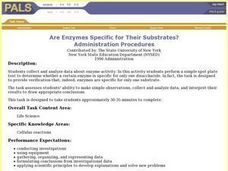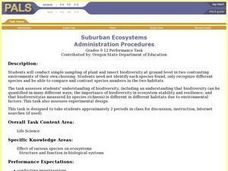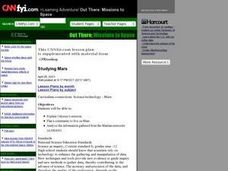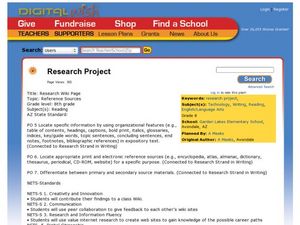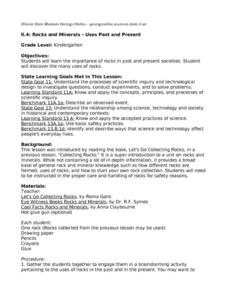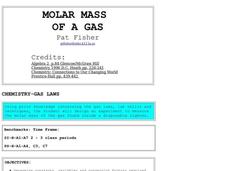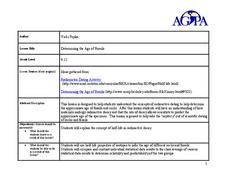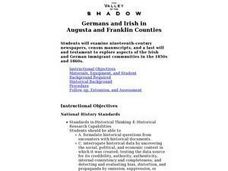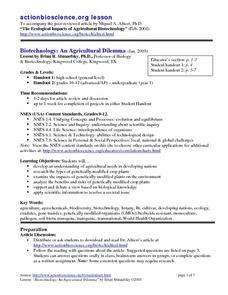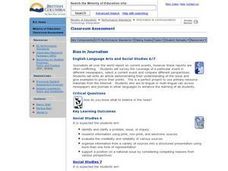Curated OER
MINI-UNIT on ELECTRICITY
Young scholars identify hypotheses related to static electricity, to begin to test the hypotheses, to begin to develop conclusions related to observations, to demonstrate that like charges repel and unlike charges attract each other, to...
Curated OER
How Effective is Perspiration at Cooling?
Students collect data on the cooling of water in two different test tubes, one that is wrapped in wet newspaper and one in dry newspaper. They then relate this cooling effect to the body's perspiration.
Curated OER
A Cut Above the Rest Administration Procedures
Students analyze how the Law of Conservation of Energy applies to the design and use of scissors. Working in groups, they determine the output work for a standard pair of scissors.
Curated OER
Are Enzymes Specific for Their Substrates?
Students discover enzyme to substrate specificity. The experiment uses samples of glucose and lactose in combination with the enzyme lactase. Students observe the reaction between the lactose and the lactase; the lack of a reaction...
Curated OER
Suburban Ecosystems
High schoolers conduct simple sampling of plant and insect biodiversity at ground level in two contrasting environments of their own choosing. They recognize and record different species then compare and contrast species numbers in the...
Curated OER
That's the Way the Ball Bounces
Students investigate and compare the bouncing ability of the materials from which four different balls are made. They determine which material performs the best for use as a basketball. After collecting data in a small group they...
Curated OER
Introduction to Toxicology
Students explore the science of toxicology and the relationship between a toxic reaction (response) and amount of substance (dose). They observe two demonstrations illustrating the concept of dose-response.
Curated OER
Historical Figures
Second graders identify a historical figure, his or her societal contributions and basic biography using a Kidspiration graphic organizer and library resources. They use the Internet to conduct an historical treasure hunt in groups.
Curated OER
Studying Mars
Students study Mars and Odyssey's mission to Mars. In groups, they plan a community that could live on Mars.
Curated OER
Research Project
Students research and discuss the history and traditions of Groundhog Day, facts about groundhogs, and find pictures of groundhogs using the Internet. They draw pictures and write stories about ground hogs.
Curated OER
Maintaining Plant Genebanks
Students examine the use, costs, and the need for plant gene banks. The rationale for gaining ownership over scientific information and the implications of the developing nations' reliance on biotechnology is explored in this lesson plan.
Curated OER
Rocks and Minerals- Uses Past and Present
Students investigate the use of rocks in past and present societies. They examine how important rocks are.
Curated OER
Holocaust Case Studies
Seventh graders become familiar with the events of the Holocaust. They research information on the Holocaust using the Internet, novels, and videos. Students present case studies involving the Holocaust to the class. They develop and...
Curated OER
What Can We Lose? What Do We Lose as we Gain Force With A Lever?
Third graders view a demonstration of a teeter totter as a basis for assessing pre-knowledge of a lever. They create a KwL chart. Students work in small groups to conduct a variety of experiments. The first requires students to tie books...
Curated OER
Fraction Equivalence
Fourth graders explore fractions. They compare different fractions using fraction bars. Students find equivalent fractions and they use fraction bars to visualize addition of fractions.
Curated OER
Rebellions
Tenth graders explore the causes and effects of the rebellions of Upper and Lower Canada and whether rebellion is an effective means of political change. They research and analyze the impact of the 1837-38 rebellions using primary and...
Curated OER
Molar Mass
Students apply the ideal gas law and Dalton's Law of Partial Pressure to develop an experiment which determine the molar mass of butane from disposable lighters. In small groups, they develop a procedure and have it approved before...
Curated OER
Determining the Age of Fossils
High schoolers examine the concept of radioactive dating. In this radioactive dating lesson, students investigate how to determine the ages of fossils and rocks as they learn about half-life radioactive decay.
Curated OER
Floating Soap
Learners explore the density of soap. In this science instructional activity, students conduct an experiment to find which types of soap will float. Learners make a hypothesis and record their observations.
Curated OER
Digging Up Facts About Dinosaurs
Second graders conduct research on a given dinosaur using various resources, complete an information sheet that be used to create their graphic organizer from, and produce a graphic organizer, using the Kidspiration software.
Curated OER
The Importance of Plants to Native Cultures in the Past and Present
Eighth graders investigate the founding and history of Sluice Boxes State Park. They use both primary and secondary resources to collect data. The focus is upon the use of native plants to make medicines. They write reports about several...
Curated OER
Germans and Irish in Augusta and Franklin Counties
High schoolers examine 19th century newspapers, a last and testament, and census manuscripts to analyze the Irish and German immigrant communities in the 1850s and 1860s. They write a letter from the perspective of an Irish or German...
Curated OER
Biotechnology: An Agricultural Dilemma
High schoolers investigate the types of genetically modified crop plants there are and the benefits and risks of such plants. The agricultural needs in developing nations for this biological knowledge to resolve societal issues is also...
Curated OER
Bias in Journalism
Students evaluate the credibility and reliability of various sources. Students survey the coverage of a particular event in different newspapers, select a current event and compare different perspectives. They write an article...



